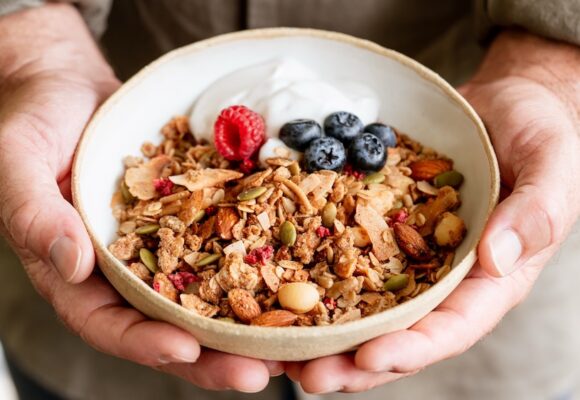
Consumer interest in health and wellbeing has grown exponentially in recent years, and so too has the body of evidence to support the role of nuts in living a long, healthy and happy life.
As the shackles of the low-fat diet movement of decades past are cast aside, nuts are emerging as one of the most relevant foods for today’s consumer. Plant-based eating is on the rise, and researchers are unearthing the wealth of health and lifestyle benefits that nuts can offer, from cardiovascular health and diabetes management to weight loss, mood management, improved fertility, and more.
Nuts offer an impressive array of nutrients, including good fats (mono and polyunsaturated fatty acids as well as plant sterols), amino acids, polyphenols, carotenoids, antioxidants, fibre, and a range of essential vitamins and minerals including calcium, magnesium, potassium, zinc, B group vitamins and Vitamin E. With a line-up like that, it’s not surprising that the scientific community is eager to find out more about these little natural wonders, and how it is they can enhance human health.
Here we take a look at some of the latest research that is increasingly painting nuts as one of the keys to help achieve optimum health and lifestyle.
Live longer
With so much research taking place in the area of nut health, it can be a little difficult to stay across all the developments. Arguably, one of the more recent powerful research findings in favour of nut consumption came from a substantial systematic review and meta-analysis conducted by English and Norwegian researchers which concluded that people who eat around a handful (~28g/day) of nuts per day have a 22% lower risk of all-cause mortality. (1) The same study also found links between nut consumption and reduced risk of heart disease and cancer.
As one of the study’s co-authors remarked, “It’s quite a substantial effect for such a small amount of food.”
The heart of the matter
One of the most publicised benefits of regular nut consumption is the myriad positive effects it can have on cardiovascular health. Studies have shown that higher consumption of tree nuts as part of a healthy diet can help reduce the risk of total cardiovascular disease (CVD) and coronary heart disease (CHD) (2,3,4,5,6)
Dr. Marta Guasch-Ferré, Research Fellow at the Department of Nutrition at Harvard T.H. Chan School of Public Health (US) and co-author of research paper “Nut consumption and risk of cardiovascular disease” said her team’s study found a 14% lower risk of CVD for those consuming nuts 5+ times per week and a 20% lower risk for CHD.
“Nuts are believed to be beneficial for heart problems mainly because of their unique nutritional composition,” said Dr Guasch-Ferré. “Some of the mechanisms that may underlie these associations include the fact that nuts have been shown to improve blood lipids (cholesterol, triglycerides), attenuate inflammatory processes and improve glucose tolerance and diabetic related traits, all of which are risk factors for CVD.“ (3, 7)
The International Nut & Dried Fruit Council recently funded a study examining the effect of nut consumption on endothelial function. (8) The study concluded that including nuts in a healthy diet may have favourable effects on the function of the endothelium, which is associated with CVD. The findings are neatly summarised in an animation available on the INC’s You Tube channel.

In Sweden, researchers have discovered that eating nuts regularly could lower the risk of developing atrial fibrillation – better known as heart flutter. The team found that eating nuts 1-3 times per month was associated with a 3% risk reduction, 1-2 times per week a 12% decrease and eating nuts 3+ times per week results in an 18% decreased risk of developing the heart rhythm irregularity. (2)
In 2011, an influential study was published that outlined a ‘portfolio’ of four foods proven to cut cholesterol and heart disease risk, one of which was nuts. Recently a Canadian research team took a closer look at what came to be known as the Portfolio Diet, concluding that the diet – which includes a 42 gram daily serve of nuts – cut LDL cholesterol (bad cholesterol) by 17% and the risk of developing coronary heart disease over the course of a decade by 13%. It also lowers triglycerides, blood pressure and C-reactive protein – a marker of inflammation. (9)
Macadamias are a rich source of healthy fats, with 81% of their total fat content being monounsaturated. A number of studies have shown that 2-3 handfuls of macadamias per day can reduce the levels of ‘bad’ LDL cholesterol and increase ‘good’ HDL cholesterol. (10)
While all this cardiovascular science may sound complex, the implications for everyday heart-healthy habits are not. “I would say that the recommendation should be to consume 4 to 7 servings per week of any type of nuts in a context of a healthy diet,” advised Dr Guasch-Ferré.
Brain health: nuts are food for thought
While cardiovascular health has grabbed many of the nut nutrition headlines in recent years, hot on its heels is brain health, with a significant amount of research being undertaken in this exciting field.
Many of the nutrients that help our brains perform at an optimum level can be found in tree nuts and studies have reported that regular nut consumption is associated with better cognitive function and may also slow or prevent the progression of age-related brain dysfunction (11).
It’s not just cognition that appears to be benefiting from higher consumption, but mood too, with nuts now among the foods that are being linked with a lower risk of depression. (12, 13)
In an Australian study, known as the SMILES trial, a study of people suffering from clinical depression saw 32% of those following a Mediterranean diet including nuts experience a remission in depression symptoms, compared to just 8% in the control group receiving standard care with no diet change. The more closely they adhered to a Mediterranean diet, the lower their score for depression and anxiety. (14)

In other studies, nut consumption has been shown to decrease depression in young men and improve mood. (15, 16). It’s thought the generous levels of tryptophan found in nuts could be the key to these improvements, as tryptophan is a precursor for the brain’s serotonin level, which in turn influences mood. (17)
Cutting cancer risks
With so many people touched by cancer in some way every year, it’s a field in which good news is always welcomed.
The results of research conducted by English and Norwegian researchers showed a 15% reduced risk of cancer in people who consume around a handful of nuts per day. (1)
The Journal of Clinical Oncology recently published the results of a study in patients with stage III colon cancer, and found that a higher consumption of nuts may be associated with a 42% reduced incidence of cancer recurrence and a 57% lower risk of death. (18)
Dutch researchers have also discovered a link between following the Mediterranean diet with nuts, and a 40% lower risk of oestrogen-receptor-negative breast cancer among post-menopausal women. (19)
Inflammatory response
There are a number of foods thought to have anti-inflammatory properties and research suggests that tree nuts can help to fight inflammation.
Inflammation has been linked to a host of health issues including arthritis, stroke, cancer, Alzheimer’s and cardiovascular disease and insulin resistance. While scientists are still working to fully understand how diet and inflammation are linked, it is thought that dietary habits may improve the microbiome of the gut, which can positively impact the body’s inflammatory response. Nuts contain antioxidants and have anti-inflammatory compounds (e.g. vitamins and minerals, polyphenols, amino acids, carotenoids and plant omega-3s), which is one of the mechanisms to explain nuts’ positive effects on health.
Diabetes management
Diabetes is on the rise and the World Health Organisation predicts it could be one of the world’s biggest killers by 2030. While experts recommend some foods should be eliminated from a diabetic diet, others should be embraced. Nuts contain nutrients and bioactive substances such as healthy fats, fibre and polyphenols that can help improve insulin function, as well as reducing the rise of blood glucose after eating. Studies have shown that eating a 30 gram handful of nuts at least four times a week reduces the risk of type 2 diabetes by 13-27%. (20, 21)
Researchers in Canada have discovered that eating 60 grams of nuts each day in place of high-carbohydrate foods improved blood lipid levels and blood sugar levels in non-insulin dependent diabetics, also lowering their risk of cardiovascular disease. (22)
Weight loss weapon
While old-school diet advice had people restricting their nut intake for fear of their fat content causing weight gain, this approach has now been debunked, as scientists discover that the opposite is in fact true. (23)
Dr. Marta Guasch-Ferré, Research Fellow at the Department of Nutrition at Harvard T.H. Chan School of Public Health (US) says “Despite nuts being an energy-dense food, there is no scientific evidence supporting associations between weight gain and nut consumption. Indeed, they have been associated with lower weight gain and lower risk of obesity, probably because they can increase satiety and fullness, which may potentially reduce the consumption of unhealthy snacks.” (7)

Furthermore, it’s now believed that counting calories is not the best path to shedding unwanted kilograms, with a study published in Journal of the American Medical Association, finding that “people who consumed less sugar, refined grains and processed foods but ate more whole foods and plenty of vegetables, without counting calories or controlling their portion sizes, lost significant amounts of weight over 12 months.” Results were the same for those whether participants followed a low fat or low carbohydrate diet, with those following the latter advised to include nuts, nut butters, and high-quality fats and oils in their eating plans. (24)
A large cross-sectional study conducted by researchers in New Zealand has shown significant associations between eating nuts more than 3 times per week with lower BMI in children and adolescents. (25)
Male fertility boost
In Spain, a study has revealed that men who snacked on a 60 gram serve of nuts each day produced better quality sperm, and had a sperm count that was on average 16% higher than men who didn’t eat nuts.
The subjects in the nut group also showed a significant reduction in their levels of sperm DNA fragmentation, a parameter closely associated with male infertility. (26)
Nut knowledge set to expand
There’s no doubt we are entering a new chapter in terms of our ability to understand the myriad health benefits that regular nut consumption can offer.
While the research conducted in recent years is extremely exciting, it’s also just the beginning, with numerous other scientific studies currently underway. We have perhaps only just scratched the surface of a large, untapped body of knowledge that could see nuts play an even more vital role in consumers’ insatiable desire to live the healthiest and happiest life possible.
What about allergies?
Childhood food allergies have risen globally over the past 50 years, with the problem particularly prevalent in Australia. Australian researchers are leading a worldwide shift in the way food allergies are managed, turning long-held advice on its head. Previously, avoidance of potential allergens was at the heart of allergy management recommendations, but early exposure is now recommended, even for high-risk children.
The Infant Feeding Project is a campaign to educate health care professionals and consumers about the importance of introducing allergenic foods (including nuts) to infants within the first year of life.
As part of the National Allergy Strategy, Nuts For Life is working with Allergy and Anaphylaxis Australia (AAA) and Australasian Society of Clinical Immunology and Allergy (ASCIA) on the Infant Feeding Project, developing recipes designed for infants incorporating nuts.
For management of allergies among school-aged children, awareness and training are now the focus of AAA’s education program, rather than blanket bans on bringing nut products to school.
Latest on labelling
Nut heart health GLHC: The first nut products featuring the new on pack general level health claim have started appearing on supermarket shelves in recent months, as Australian and New Zealand producers take advantage of their first-ever opportunity to communicate a nut health claim directly to consumers. The claim, which links nut consumption to heart health, applies to unsalted, raw, dry or oil roasted nuts, either whole, or as pieces or nut butters. For more information on how to access the claim, contact admin@nutsforlife.com.au
FDA rules in favour of macadamias: The US Food and Drug Administration (FDA) has approved the use of a qualified health claim by manufacturers linking macadamia consumption with a reduced risk for coronary heart disease. The FDA had already approved a qualified health claim relating to the consumption of other tree nuts. However this is the first time a macadamia-specific health claim has been permitted, and represents a significant win for macadamia producers with US interests.
Healthy Handful Daily: the Healthy Handful logo has experienced widespread uptake by nut producers and is gaining strong traction as a visual reminder to consumers of the importance of enjoying a 30 gram daily serve of their favourite nuts. To access the logo head to Nutsforlife.com.au
Nuts For A Healthier World
The International Nut & Dried Fruit Council has produced a campaign called Nuts For a Healthier World, designed to make a difference to those who need it most. Every time the Nuts For a Healthier World video is shared on social media, a 28 gram pack of mixed nuts and dried fruit is donated to a disadvantaged community. So far it’s been shared more than 3,000 times – go to nutsforgifts.org for more details.
References:
1) Aune D. et al. ‘Nut consumption and risk of cardiovascular disease, total cancer, all-cause and cause-specific mortality: a systematic review and dose-response meta-analysis of prospective studies.’ BMC Medicine 2016 14:207 https://doi.org/10.1186/s12916-016-0730-3
2) Larsson SC, Drca N, Bjork M, Back M & Wolk A. ‘Nut consumption and the incidence of seven cardiovascular diseases’ Heart 2018
3) Guasch-Ferre M, Liu X, Malik VS, Sun Q, Willett WC, Manson JE,…& Bhupathiraju SN, ‘Nut consumption and risk of cardiovascular disease’ Journal of the American College of Cardiology 2017; 70 (20): 2519-2532
4) Fraser GE. Et al. ‘A possible protective effect of nut consumption on risk of coronary heart disease. The Adventist Health Study.’ Arch Intern Med. 1992 Jul;152(7):1416-24.
5) Hu FB. Et al. ‘Frequent nut consumption and risk of coronary heart disease in women: prospective cohort study’. (Nurses’ Health Study,) BMJ 1998; 317 doi: https://doi.org/10.1136/bmj.317.7169.1341 BMJ 1998;317:1341 (
6) lbert CM. et al. ‘Nut consumption and decreased risk of sudden cardiac death in the Physicians’ Health Study.’ Arch Intern Med. 2002 Jun 24;162(12):1382-7.
8) Neale E. et al. ‘The effect of nut consumption on markers of inflammation and endothelial function: a systematic review and meta-analysis of randomised controlled trials.’ BMJ 2017 10.1136/bmjopen-2017-016863
9) Chiavaroli l. et al. ‘Portfolio Dietary Pattern and cardiovascular disease: a systematic review and meta-analysis of controlled trials’ https://doi.org/10.1016/j.pcad.2018.05.004
10) Nuts For Life: Macadamia Fact Sheet, 2016 https://www.nutsforlife.com.au/nut-fact-sheets/macadamiahealthfacts/
11) Nuts For Life: Nuts and Brain Health Fact Sheet https://www.nutsforlife.com.au/health-fact-sheets/nuts-and-brain-health/
12) Lang UE, et al. ‘Nutritional aspects of depression.’ Cell Physiol Biochem, 2015. 37(3): p.1029-43.
13) Su Q, et al. ‘Nut consumption is associated with depressive symptoms among Chinese adults.’ Depress Anxiety, 2016.
14) Jacka FN, et al. ‘A randomised controlled trial of dietary improvement for adults with major depression (the ‘SMILES’ trial).’ BMC Medicine, 2017. 15(1): p.2
15) Pribis P. ‘Effects of Walnut Consumption on Mood in Young Adults-A Randomized Controlled Trial.’ Nutrients, 2016. 8(11).
16) Prohan M, et al. ‘Total antioxidant capacity of diet and serum, dietary antioxidant vitamins intake, and serum hs-CRP levels in relation to depression scales in university male students.’ Redox Rep, 2014. 19(3): p.133-9.
17) Hulsken S, et al. ‘Food-derived serotonergic modulators: effects on mood and cognition.’ Nutr Res Rev, 2013. 26(2): p.223-34.
18) Fadelu T, Zhang S, Niedzwiecki D, Ye X, Saltz LB, Mayer RJ,…& Atienza DM. ‘Nut Consumption and Survival in Patients with Stage III Colon Cancer: Results From CALGB 89803 (Alliance)’, Journal of Clinical Oncology 2018.
19) van den Brandt PA, Schulpen M, ‘Mediterranean diet adherence and risk of postmenopausal breast cancer: results of a cohort study and meta‐analysis’, First published: 05 March 2017 https://doi.org/10.1002/ijc.30654
20) Afshin A et al. ‘Consumption of nuts and legumes and risk of incident ischemic heart disease, stroke, and diabetes: a systematic review and meta-analysis.’ 2014 10.3945/ajcn.113.076901
21) Jiang R. et al. ‘Nut and peanut butter consumption and risk of type 2 diabetes in women.’ 2002 JAMA 288(20); 2554-60
22) Jenkins, D.J. et al. 2018. ‘Nuts as a replacement for carbohydrates in the diabetic diet: a reanalysis of a randomised controlled trial.’ Diabetologia https://doi.org/10.1007/s00125-018-4628-9
24) Gardner C et al. ‘Effect of Low-Fat vs Low-Carbohydrate Diet on 12-Month Weight Loss in Overweight Adults and the Association With Genotype Pattern or Insulin Secretion The DIETFITS Randomized Clinical Trial’, JAMA. 2018;319(7):667-679. doi:10.1001/jama.2018.0245
25) Mitchell, E et al. ‘Factors associated with body mass index in children and adolescents: An international cross-sectional study.’ 02 May 2018, PLoS One, 13(5): e0196221. doi: 10.1371/journal.pone.0196221
26) https://www.eshre.eu/ESHRE2018/Media/ESHRE-2018-Press-releases/Salas.aspx


